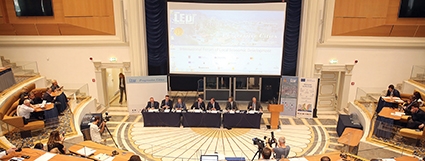An Overview: 10th International Forum of Local Economic Development
The 10th International Forum of Local Economic Development, held on September 13-14 at The Biltmore Hotel, organized by the Tbilisi Municipality, was attended by hundreds of top international speakers from USA, Austria, Germany, England, Spain, Italy, France, Moldova, Ukraine, Sweden, Netherlands, Slovakia, Poland, Belgium, Armenia, Azerbaijan, Kazakhstan, Israel and Turkey- coming together to discuss topics ranging from governance, cities for economic growth, urban resilience, smart environment, energy efficiency, entrepreneurial opportunities in global trade, international relations, city tourism, open government partnerships, integrated approaches for territorial development and many other subjects.
The forum ended Thursday with a concluding panel discussion on Green City for Smart Transformation, with Tbilisi Mayor Davit Narmania; Deputy Mayor Irakli Likvinadze; First Deputy Minister of Environment and Natural Resources Protection of Georgia, Solomon Pavliashvili; Deputy Mayor of Kiev, Gennadiy Pils; Deputy Mayor of Bialystock, Rafal Rudnicki; Principal Economist, Economics, Policy and Governance EBRD, Kjetil Tvedt; and Robert Bailey, Director of ENVIROS s.r.o, EBRD consultant.
“We had an extremely active two days, seeing 16 different directions covered, with almost 800 delegates from 13 countries and hundreds of presenters participating,” Likvinadze said.
Gennadiy Pils, the first speaker in the panel, talked about recent developments and infrastructure projects finalized in Kiev. “Our priority is to have fewer loans and more investment,” he said. “Financial independence is very important for us, especially considering the conflict and the situation in the East of the country, and we’re doing all we can to improve financial indicators. All financial transactions of all budgetary organizations are now visible and transparent,” he added.
The biggest challenge, he noted, is not having the chance to authorize a city master plan, combined with the problem of existing waiting lists for children to join municipal kindergartens and public schools. However, he said the municipality has introduced a civic budget planning initiative, which enables citizens to be actively involved in local budget planning and, according to the mayor, “the results are very positive”.
“Tbilisi will soon face new challenges, challenges that arise from the expectations of the citizens, from the inhabitants of Tbilisi,” Rudnicki, Deputy Mayor of Bialystock, Poland said. “Our citizens wanted life in the city to be comfortable and easier. Good roads and communications are not enough,” he noted, highlighting that they are now focusing more on rational spatial management possibilities, and going on to talk about the major initiatives and projects carried out, focusing on the concept of the ecological city to improve the quality of life.
The next presenter, Solomon Pavliashvili, mentioned that the Ministry of Environment fully supports the Green City initiative; however, he noted that there are numerous problems on the way of bringing the Green City concept in Tbilisi to life and creating a sustainable urban environment. As Pavliashvili noted, the emissions from the energy sector make 38% of all emissions, which makes the use of alternative sources of energy vitally important. He also pointed out that, with regards to the city transport system, although some positive steps have been made, more attention needs to be paid to the development of public transport, reducing the number of private vehicles used and on choosing more electric and “clean” energies. The Deputy Minister also talked about the waste problems especially visible in the surrounding of Tbilisi,
The second part of the panel discussion focused on the Green City Action Plan for the city of Tbilisi, carried out by the EBRD in partnership with Tbilisi City hall.
“The EBRD has worked with many cities in supporting and implementing investment focusing on the Green Agenda,” Tvedt said, noting that the Green City Action Plan for Tbilisi is based on diagnostics and solutions to identify actions needed for policy initiatives.
The document itself was then presented by EBRD consultant Robert Bailey.
“Considerable work has to be done across numerous areas, from rehabilitation of buildings, renewing the bus fleet and bringing in low emission buses, to modernizing street lighting, and renewing water distribution and wastewater treatment, all according to the recommendations given,” he said, highlighting more green spaces within the city being “crucial”. In order to achieve these goals, the resources required come from city budget, national government, private sector and international institutions.
The Green City Action Plan will be approved by City Hall by the end of September and will then be made publicly available.
Davit Narmania, the Mayor of Tbilisi, closed the session by summarizing the 10th International Forum of Local Economic Development, highlighting the many themes presented during the conference and the initiatives that are being and need to be undertaken to make Tbilisi more sustainable to live in.
He also spoke about the Mayors for Economic Growth initiative from the European Union within the Eastern Partnership framework, a special certificate of which was awarded to the Mayor himself Peter Korsby, Mayors for Economic Growth representative, in recognition of the fact that Tbilisi had also joined the initiative.
The conference then ended with the signing of the declaration of the 10th International Forum of Economic Development.
A closer look at the city development topic of the Forum on page 10.
Nino Gugunishvili











